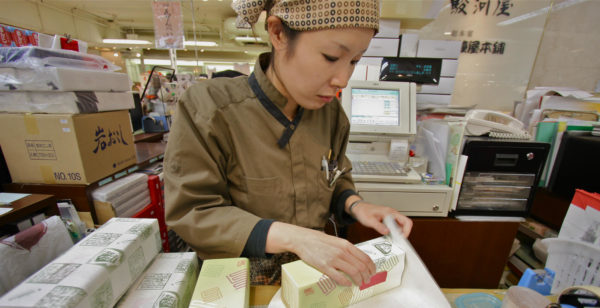
About guest author Rochelle Kopp: Rochelle is managing principal of Japan intercultural consulting, an international training and consulting firm focused on Japanese business. She is also co-author of The lowdown: business etiquette Japan.
Oseibo originated with the custom of placing offerings on ancestors’ graves, when people would distribute the requisite items, such as sake, rice cakes, or cured salmon. Over time, the custom morphed into more general gift-giving.
Oseibo gifts are intended to be an expression of thanks to someone who has shown you kindness during the year. They might be given to clients, superiors at work, and important people such as your doctor or landlord. Traditionally, the gifts exchanged as oseibo are consumables — food (like the cantaloupe pictured) or household goods such as soap.
In the past, oseibo gifts were considered obligatory, but in recent years oseibo seems to have been overtaken by a recently imported custom, the exchange of Christmas presents. While oseibo carries the nuance of a public obligation, Christmas gifts are considered to be a more private expression. Christmas gifts are usually given to family members, or close friends, not business associates. In a sense, marketers in Japan very cleverly built upon the existing idea of giving a gift at year-end, and reshaped it into something with a more modern and personal feeling.
Changing corporate norms have had an impact as well, as some companies have discouraged oseibo exchange (either between employees or from customers) that might be viewed as attempts to curry favor, and also tightened expense accounts have put a damper on purchases. Customs differ by industry, but nowadays most Japanese companies limit their year-end gifts to modest items like calendars or datebooks.
Everywhere in Japan, in December, you’ll see elaborate displays of Christmas decorations, and Christmas-themed treats intended for gift-giving. At the same time, you’ll also see displays of the traditional oseibo items — beer, ham, sausages, premium cooking oils and other fancy packaged foods.
If you are American and have Japanese customers or good Japanese friends, they will surely appreciate a small gift item at year end, with a seasonal theme, and you don’t have to specify whether it’s for oseibo or for Christmas. Surveys show that sweets and dessert items are among the most popular oseibo gifts, similar to what’s common in western countries for year-end gift-giving, so those types of items are a safe choice. Also similar to western traditions, year-end corporate gifts are typically exchanged in December, and early enough in the month to avoid vacations or work crunches during the last days of the year.
Insights for global growth

Power your strategic growth
Go beyond tactical localization with tailored, strategic solutions that resonate locally and drive growth globally.
Get started





